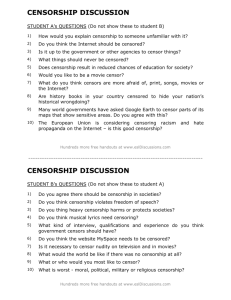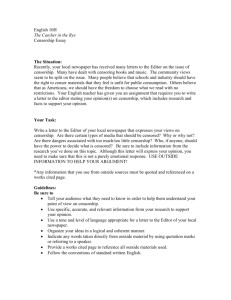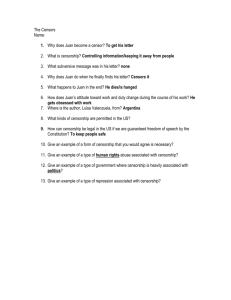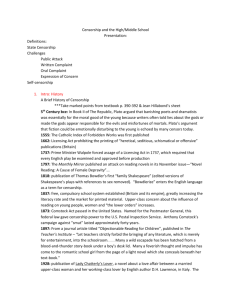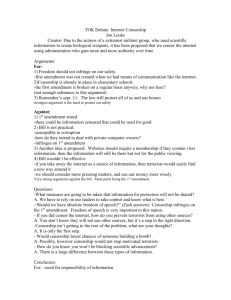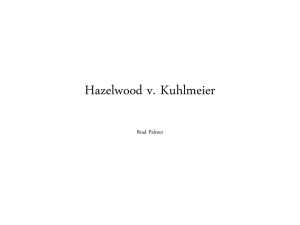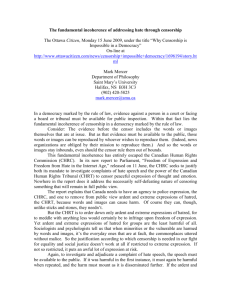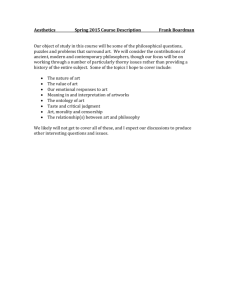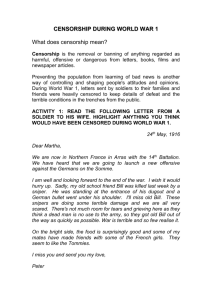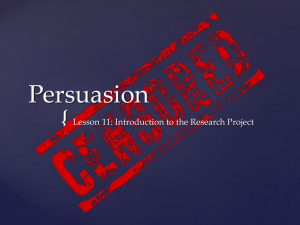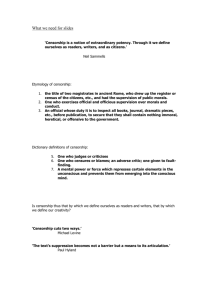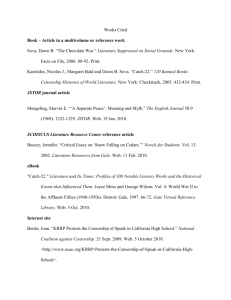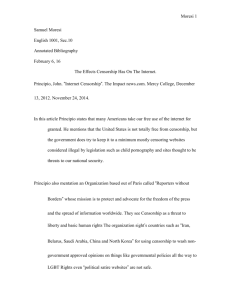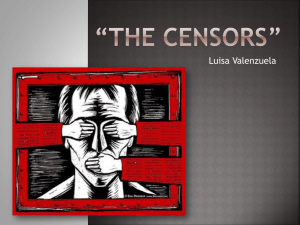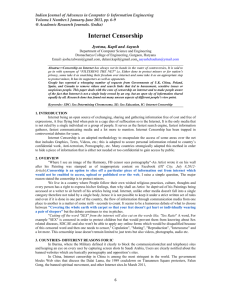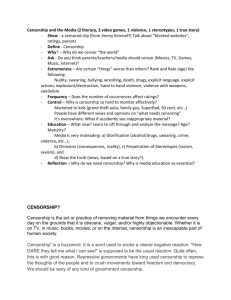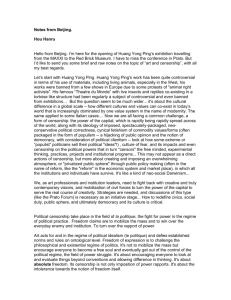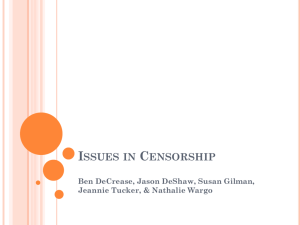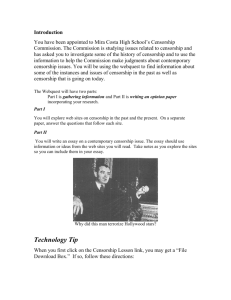Tam Nga Yin - CCSC English Website
advertisement
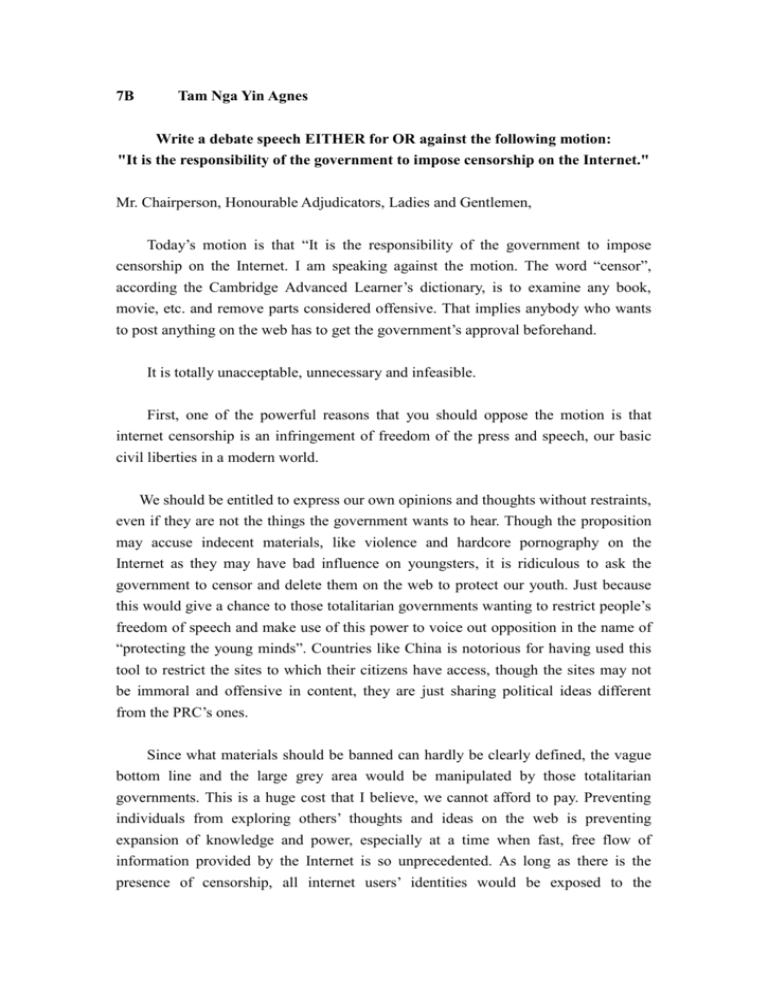
7B Tam Nga Yin Agnes Write a debate speech EITHER for OR against the following motion: "It is the responsibility of the government to impose censorship on the Internet." Mr. Chairperson, Honourable Adjudicators, Ladies and Gentlemen, Today’s motion is that “It is the responsibility of the government to impose censorship on the Internet. I am speaking against the motion. The word “censor”, according the Cambridge Advanced Learner’s dictionary, is to examine any book, movie, etc. and remove parts considered offensive. That implies anybody who wants to post anything on the web has to get the government’s approval beforehand. It is totally unacceptable, unnecessary and infeasible. First, one of the powerful reasons that you should oppose the motion is that internet censorship is an infringement of freedom of the press and speech, our basic civil liberties in a modern world. We should be entitled to express our own opinions and thoughts without restraints, even if they are not the things the government wants to hear. Though the proposition may accuse indecent materials, like violence and hardcore pornography on the Internet as they may have bad influence on youngsters, it is ridiculous to ask the government to censor and delete them on the web to protect our youth. Just because this would give a chance to those totalitarian governments wanting to restrict people’s freedom of speech and make use of this power to voice out opposition in the name of “protecting the young minds”. Countries like China is notorious for having used this tool to restrict the sites to which their citizens have access, though the sites may not be immoral and offensive in content, they are just sharing political ideas different from the PRC’s ones. Since what materials should be banned can hardly be clearly defined, the vague bottom line and the large grey area would be manipulated by those totalitarian governments. This is a huge cost that I believe, we cannot afford to pay. Preventing individuals from exploring others’ thoughts and ideas on the web is preventing expansion of knowledge and power, especially at a time when fast, free flow of information provided by the Internet is so unprecedented. As long as there is the presence of censorship, all internet users’ identities would be exposed to the government, we will lose our anonymity and confidentiality when we try to write a blog. This is definitely discouraging the sharing of ideas and of course, discouraging the growth and diversity of a society. When we are supposed to treasure such an information medium brought by our advanced technology and savour the fruits of fighting for liberties and freedom which symbolize our delicate civilization, I simply do not see why our opponents have to take a step backwards and forgo our civil rights. Second, I would like to elaborate on why internet censorship is not necessary. Ladies and gentlemen, if you all believe that we are mature individuals, living in a civilized society, then you would agree with me that should be able to exercise self-regulation but not depending on the government to control what we should read or should not read. What the government deems “good” is not necessarily the way t we consider so. Very often, it is not. Even if it is information objectionable, it is up to the citizens to decide how to take it after their own analysis and thinking. Perhaps the proposition may again adamantly argue that the teenagers are not mature enough to judge what to read, again, it is not the government’s responsibility to give advice but their parents. The parental regulation is the most efficient and reasonable way to nurture a child’s mind. It’s the parents and teachers who can explain to children why porno and violence are bad. While the government, at its most, can only ban indecent materials without giving children any reason. That doesn’t help in nurturing the young minds. After all, persuasion, not coercion is the solution. If a kid wants to read porno things, he or she can get a magazine easily from bookstores or anywhere other than the Internet. Sure the government can ban some websites, but there is no way to ban curiosity. Besides, if one doesn’t want the kids to have access to websites containing violent and adult content, he or she can make use of the web filtering system widely available nowadays. And they are proved to be very efficient. Also, there are already laws against any publication and production of hardcore pornography and violence. They are enough to deter people from doing so. Last but not least, internet censorship by the governments is not practical in a sense even if a government can successfully censor websites within its border, it is impossible for it to censor ones overseas abroad. Moreover, the standards for “decency” vary greatly among nations; countries like China are more conservative than the broad-minded ones like the USA. I wonder why we still have to pour our resources on doing something so infeasible! We are not saying everything on the web would not jeopardize our society, however, using censorship is a double-edged sword which requires us to pay a high price if manipulated by evil governments. Our freedom of speech is something we do not compromise, and never will. Seeing it not necessary and feasible, I hope the audience would agree with us that today’s motion does not stand. Thank you!


